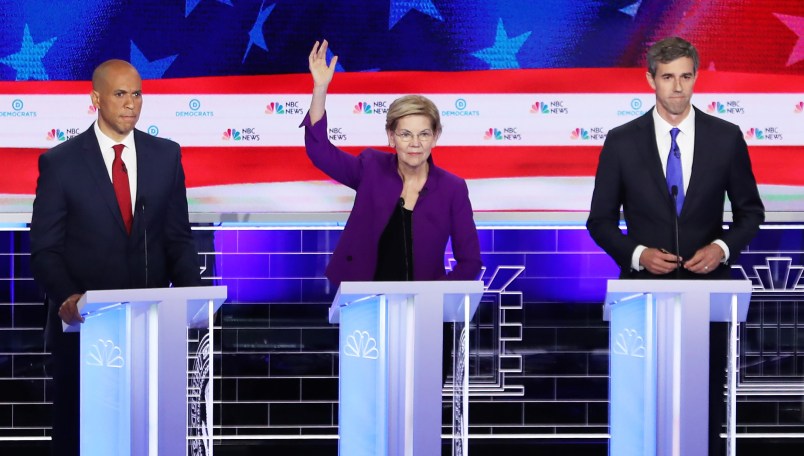The first Democratic debate of 2020 began with very little in the form of stark contrasts shown between candidates, as they used questions about the economy to pivot to the key points they wanted to make about their campaigns.
That all changed when the moderators shifted the topic to health care and provoked confrontations among the candidates that allowed some differences in their platforms come into focus.
The moderators kicked the segment off by asking for a show hands among those who would support the end of private insurance in favor of a government-run plan.
Only New York City Mayor Bill de Blasio and Sen. Elizabeth Warren (D-MA) raised their hands. While many candidates have adopted the rhetoric of Medicare for All on the trail, fewer are willing to own up to the implications of a single payer health care system.
The line of the questions proved to be the first place in the debate where real fireworks erupted among the candidates, as they took implicit and explicit shots at their counterparts’ health care plans.
Sen. Amy Klobuchar (D-MN) complained about the prospect of “kicking half of America off of their health insurance.” She rattled off proposals to rein in prescription drug prices instead.
Warren defended her embrace of single payer by talking about the families who have gone broke under a health care system tilted towards insurance company’s pursuit of profits.
“I understand, there are a lot of politicians who say oh, it’s just possible, we just can’t do it, we have a lot of political reasons for this,” Warren said. “What they are really telling you is, they just won’t fight for it. Well health care is a basic human right and I will fight for basic human right.”
De Blasio wasn’t going to let Warren be the only candidate to use Medicare for All to claim a moral high ground.
While former Rep. Beto O’Rourke (D-TX) explained why he was now supporting a more moderate approach to overhauling the health care system, de Blasio jumped in to criticize that view.
As O’Rourke began to respond, former Rep. John Delaney (D-MD) interrupted to bash the push to end private insurance.
“We should be the party that keeps what’s working and fixes what’s broken,” he said.
Rep. Tulsi Gabbard (D-HI) and Sen. Cory Booker (D-NJ) also got a chance to lay out their plans for universal health care. Both gave fairly vague answers promising better care at lower costs to Americans.
But Warren saw Gabbard’s answer as one more shot to distinguish herself and her willingness to take on the private insurance industry from the rest of the crowd.
“We have a giant industry that wants our health care system to stay the way it is. Because it’s not working for families, but it’s sure as heck working for them,” she said.






